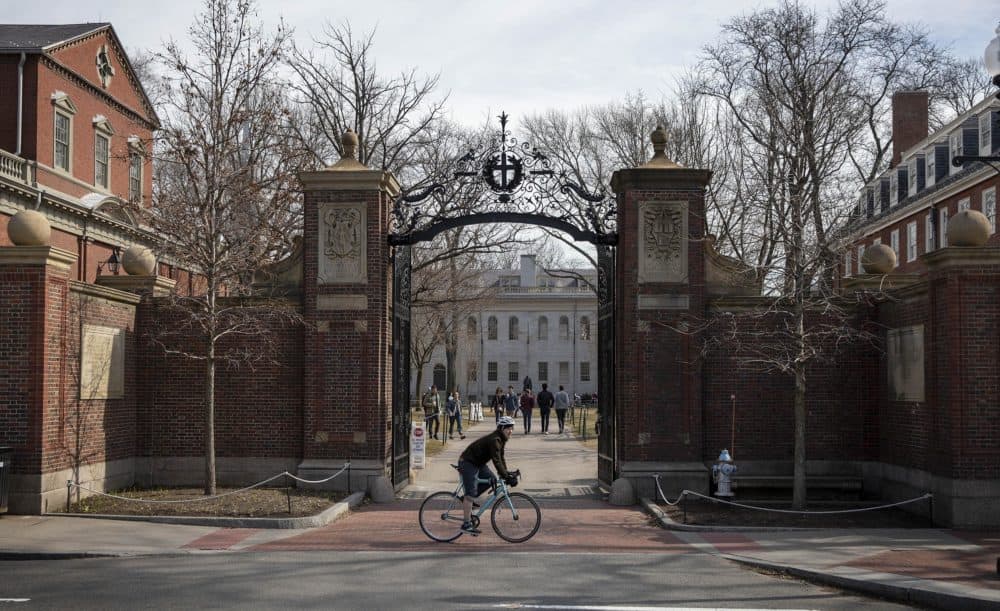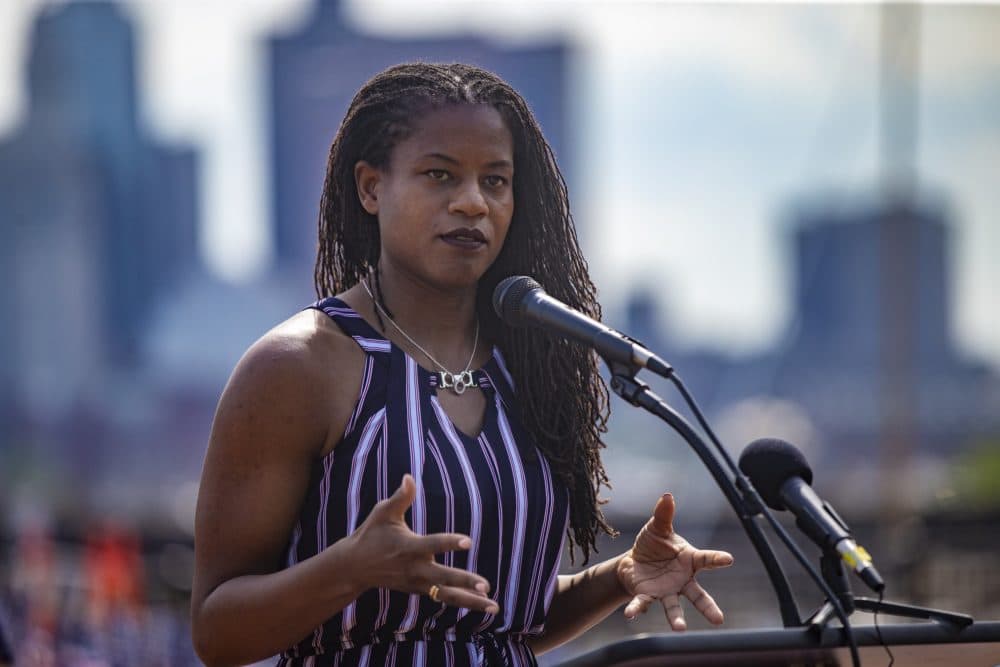Advertisement
Pressure builds to end legacy preferences in college admissions
Resume
Colleges across the U.S. are selecting students for their incoming classes. It's the first time they've done so since the Supreme Court barred the formal consideration of race in admissions.
But on many campuses, another controversial admissions practice remains in effect: “legacy preferences,” or an admissions advantage given to the children or relatives of their alumni.
That practice — which, studies suggest, disproportionately benefits white and wealthy applicants — faces mounting scrutiny in a number of states, including Massachusetts.
A bill this session sponsored by state Sen. Lydia Edwards of East Boston would bar the use of legacy preferences at any degree-granting institution, public or private, in Massachusetts.
Such a bill would hit hard in Massachusetts, where dozens of mostly private institutions still consider applicants’ relations to alumni when deciding whom to admit.
But outside intervention may be necessary, advocates say.
“After the affirmative action case, I hoped that we would have seen more institutions come forward” and ban legacy preferences on their own, said Mary Tamer, executive director of Democrats for Education Reform, a lobbying group that is supporting the bill. “But we also know that change can be hard, and sometimes people need a bit of a push.”
The proposed ban cleared an important hurdle in February, winning approval from the state legislature’s joint committee on higher education. But it may face long odds from here.
In a statement sent to WBUR, the state Association of Independent Colleges and Universities — which represents 59 private institutions statewide — criticized the effort, arguing that its member institutions should be free to shape their admissions processes free from outside interference.
And the brief bill doesn’t provide much detail about how the state could enforce the ban against institutions with billion-dollar endowments and considerable political influence.
Still, education policy experts say that efforts like this one play an important role in challenging a practice they say impedes equitable access to selective schools — one they say is both unfair and politically toxic.
Scholar Richard Kahlenberg, a longtime critic of legacy preferences, said bills like this “send a clear message to universities: ‘You need to find new ways to diversify.’ "
“It’s unacceptable to allow racial diversity to plummet [after the Supreme Court ruling]. And ending legacy preferences is pretty low-hanging fruit,” said Kahlenberg, who works at the Progressive Policy Institute, a left-of-center think tank.
Why ban legacy preferences?
Before and after the Supreme Court decision banning affirmative action last June, some states and colleges acted to suspend legacy preferences.
Colorado became the first state to enact such a ban, though only at its public institutions, in 2021, while Amherst College ended its use of the practice that same year. And last summer, after the Supreme Court decision, Wesleyan University in Connecticut followed Amherst’s lead.
And just last week, Virginia Gov. Glenn Youngkin signed a bill banning legacy preferences at that state’s public institutions, including the University of Virginia and the College of William & Mary.
Legacy preferences were never ubiquitous. For example, representatives at two of Massachusetts’ most selective private institutions, like MIT and the Olin College of Engineering, say they’ve never formally considered alumni relations in admissions decisions.
But other institutions have stood by the practice.
Harvard officials said this fall that they’re conducting an internal review of legacy preferences. But they remain in place for now — granting the children of alumni as much as a fivefold increase in their chances of admission to Harvard, according to a 2019 analysis.
Last July, state civil rights groups challenged Harvard’s use of legacy as a form of discrimination, prompting a federal investigation. Other Bay State schools like Williams College, Tufts University and Boston College consider applicants’ relations to alumni.
Though Edwards could not be reached for comment, she explained the bill’s rationale in an Oct. 2023 panel at Boston University.
By way of analogy, Edwards described her years as a law student watching classmates with family ties in the profession secure “massive internships” and other opportunities.
“I [was] thinking, ‘I’m just not smart enough, my grades aren’t good enough’ — no. They didn’t even have to get in line," Edwards said. "The rest of us are in line."

When it comes to enforcement, Edwards’ bill suggests the legacy ban could be enforced by the use of the state's existing powers over degree-granting authorities.
An alternative state bill targeted institutional finances, with up to seven-figure “fees” assessed to schools that still used legacy preferences, but that bill hasn't yet received committee approval.
Both efforts speak to growing concerns that "legacy" status carries outsized influence in admissions — a view reinforced by new findings of a Stanford-Harvard team in admissions data at 11 highly-selective schools.
After Amherst College suspended the practice in 2021, the children of its alumni won seats — albeit at lower rates, from a long-term average of 11% to just 6%. And that same year, the college admitted an unprecedented number of students who were the first in their family to attend college, at 19%.
Raul Fernandez, a scholar and advocate focused on education equity based in Brookline, acknowledged that some alumni might be upset if legacy preferences were suddenly suspended. For that reason, he said, universities should perhaps welcome a ban imposed from the outside.
“They can say, ‘It’s not our doing,’ right? ‘Take it up with the state legislature,’ ” he said.
Doubts and defiance
At a polarized political moment, legacy preferences represent a rare point of consensus.
A 2022 Washington Post poll found that nearly 75% of Americans surveyed thought the practice was “inappropriate.” President Biden has urged colleges to examine whether legacy practices hold them back from building up diversity. And the Virginia bill won unanimous bipartisan support before being signed by Youngkin, a conservative Republican.
But popular or not, some doubt that such bans will have a pronounced effect on racial or socioeconomic diversity on campus.
Finances, for example, play a much larger role in thwarting the college dreams of lower-income students, said Angel Perez, head of the National Association for College Admission Counseling.
As a former admissions director at Trinity College in Connecticut, Perez would regularly show the college’s trustees well-qualified, first-generation students his staff had had to turn away.
“The trustees would just look at me and say, ‘How could you not admit these students? They're incredible,’ ” Perez said. “And I would say, ‘Because we can't afford to do that — because we need a certain number of students who can pay the tuition so that we can meet our operating budget.’ ”
As it instituted its own legacy ban three years ago, Amherst College also stepped up its annual financial aid by $71 million. That’s a step it could afford as one of the wealthiest colleges, per capita, in the nation — but not one that every college could emulate.
Perez said he's also worried about the politicization of private colleges’ admissions processes at the state level.
“I’m very concerned that we are experiencing a moment in American history where higher education has become the enemy,” he said, conjuring a “slippery slope” to an ever more politicized admissions process.
In a statement, Sonya Hagopian — spokesperson for the Association of Independent Colleges and Universities in Massachusetts — said that each of the organization's member institutions is "unique" and that “ultimately, admissions practices and decisions should be made by individual institutions.”
As those schools wrestle separately with the effects of the Supreme Court’s affirmative action decision, she added, “that process should move forward without government mandates.”
This segment aired on March 14, 2024.
